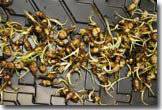
Indigenous Food Systems Network
The Indigenous Food Systems Network Website was developed by the WGIFS and is designed to allow individuals and groups involved with Indigenous food related action, research, and policy reform to network and share relevant resources and information.
The medicine wheel is a powerful learning and teaching tool. It represents balance, wholeness and interconnectedness between all four quadrants. Click on the words in each quadrant to explore the resources related to each theme and subtheme. You can also browse through all of the resources or read and share information about profiles, events & activities, stories and legends, recipes, and tools & skill building items.
Indigenous Land and Food Systems
The vast myriad of rivers, watersheds, landforms, vegetation and climatic zones have worked together for thousands of years to shape and form Indigenous land and food systems. Consisting of a multitude of natural communities, Indigenous food systems include all of the land, air, water, soil and culturally important plant, animal and fungi species that have sustained Indigenous peoples over thousands of years. All parts of Indigenous food systems are inseparable and ideally function in healthy interdependent relationships to transfer energy through the present day agriculture based economy that has been developed and industrialized through the process of colonization.
In contrast to the highly mechanistic, linear food production, distribution, and consumption model applied in the industrialized food system, Indigenous food systems are best described in ecological rather than neoclassical economic terms. In this context, an Indigenous food is one that has been primarily cultivated, taken care of, harvested, prepared, preserved, shared, or traded within the boundaries of our respective territories based on values of interdependency, respect, reciprocity, and ecological sensibility. As the most intimate way in which Indigenous peoples interact with our environment, Indigenous food systems are in turn maintained through our active participation in traditional land and food systems.
Why must we work towards food sovereignty in Indigenous communities?
Since the time of colonization, Indigenous communities have witnessed a drastic decline in the health and integrity of Indigenous cultures, ecosystems, social structures and knowledge systems which are integral to our ability to respond to our own needs for adequate amounts of healthy Indigenous foods. Indigenous food sovereignty provides a restorative framework for health and community development and reconciling past social and environmental injustices in an approach that people of all cultures can relate to. “Food will be what brings the people together”. Secwepemc Elder, Jones Ignace.
Explore by Resource Keywords
Welcome to the IFSN Website!
We are very grateful for the many recent opportunities to network and learn about the work you are all doing on Indigenous food related action, research and policy reform.
We invite you to become a part of our rapidly expanding online community. It's real easy!
Just visit the help page on the yellow bar above to join our network and register. Once you are registered, all you have to do is log in and create content.
Above all...have fun surfing the IFSN website and be creative with the content you share!
Events & Activities
There are no activities planned for this time period.



